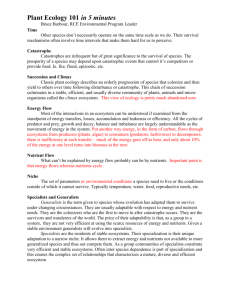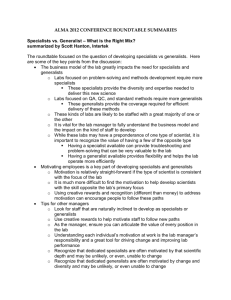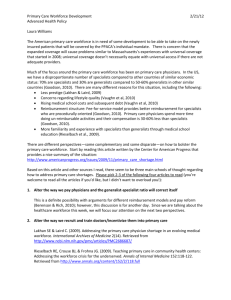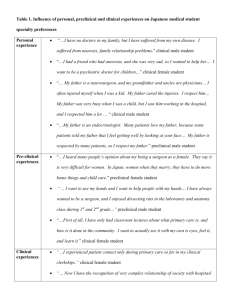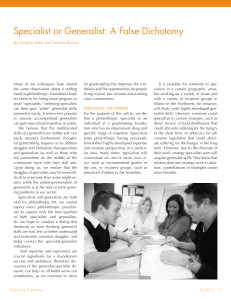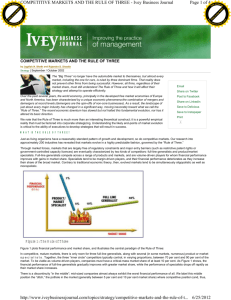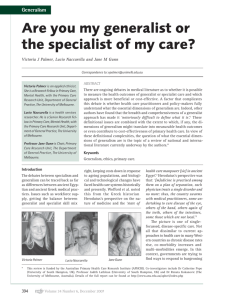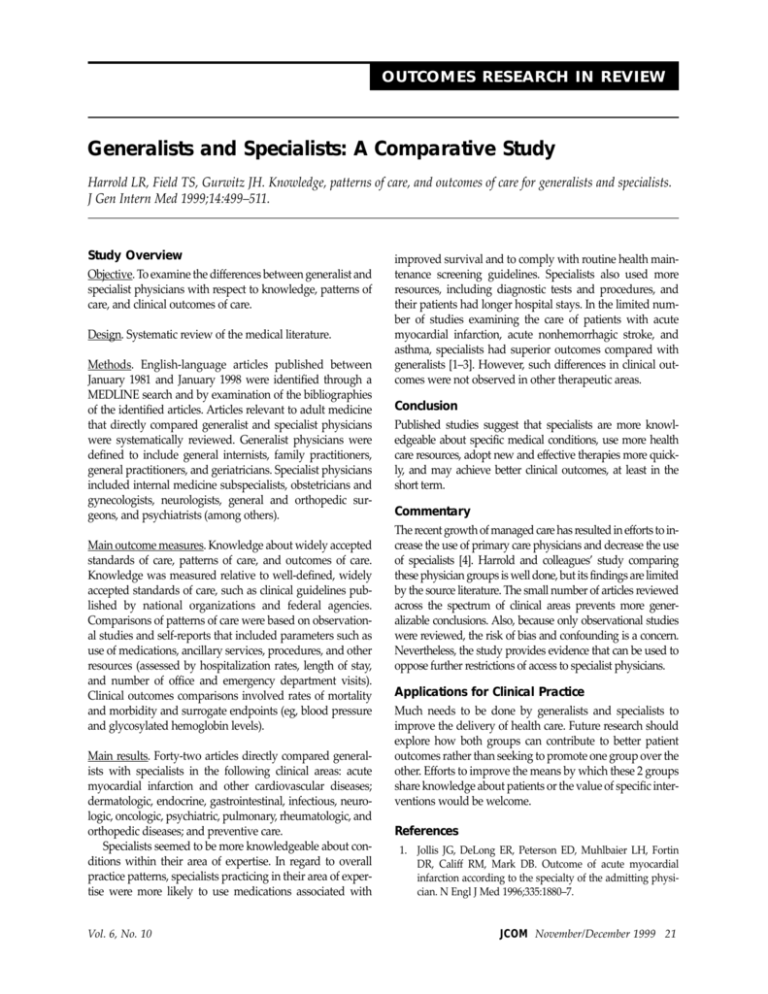
OUTCOMES RESEARCH IN REVIEW
Generalists and Specialists: A Comparative Study
Harrold LR, Field TS, Gurwitz JH. Knowledge, patterns of care, and outcomes of care for generalists and specialists.
J Gen Intern Med 1999;14:499–511.
Study Overview
Objective. To examine the differences between generalist and
specialist physicians with respect to knowledge, patterns of
care, and clinical outcomes of care.
Design. Systematic review of the medical literature.
Methods. English-language articles published between
January 1981 and January 1998 were identified through a
MEDLINE search and by examination of the bibliographies
of the identified articles. Articles relevant to adult medicine
that directly compared generalist and specialist physicians
were systematically reviewed. Generalist physicians were
defined to include general internists, family practitioners,
general practitioners, and geriatricians. Specialist physicians
included internal medicine subspecialists, obstetricians and
gynecologists, neurologists, general and orthopedic surgeons, and psychiatrists (among others).
Main outcome measures. Knowledge about widely accepted
standards of care, patterns of care, and outcomes of care.
Knowledge was measured relative to well-defined, widely
accepted standards of care, such as clinical guidelines published by national organizations and federal agencies.
Comparisons of patterns of care were based on observational studies and self-reports that included parameters such as
use of medications, ancillary services, procedures, and other
resources (assessed by hospitalization rates, length of stay,
and number of office and emergency department visits).
Clinical outcomes comparisons involved rates of mortality
and morbidity and surrogate endpoints (eg, blood pressure
and glycosylated hemoglobin levels).
Main results. Forty-two articles directly compared generalists with specialists in the following clinical areas: acute
myocardial infarction and other cardiovascular diseases;
dermatologic, endocrine, gastrointestinal, infectious, neurologic, oncologic, psychiatric, pulmonary, rheumatologic, and
orthopedic diseases; and preventive care.
Specialists seemed to be more knowledgeable about conditions within their area of expertise. In regard to overall
practice patterns, specialists practicing in their area of expertise were more likely to use medications associated with
Vol. 6, No. 10
improved survival and to comply with routine health maintenance screening guidelines. Specialists also used more
resources, including diagnostic tests and procedures, and
their patients had longer hospital stays. In the limited number of studies examining the care of patients with acute
myocardial infarction, acute nonhemorrhagic stroke, and
asthma, specialists had superior outcomes compared with
generalists [1–3]. However, such differences in clinical outcomes were not observed in other therapeutic areas.
Conclusion
Published studies suggest that specialists are more knowledgeable about specific medical conditions, use more health
care resources, adopt new and effective therapies more quickly, and may achieve better clinical outcomes, at least in the
short term.
Commentary
The recent growth of managed care has resulted in efforts to increase the use of primary care physicians and decrease the use
of specialists [4]. Harrold and colleagues’ study comparing
these physician groups is well done, but its findings are limited
by the source literature. The small number of articles reviewed
across the spectrum of clinical areas prevents more generalizable conclusions. Also, because only observational studies
were reviewed, the risk of bias and confounding is a concern.
Nevertheless, the study provides evidence that can be used to
oppose further restrictions of access to specialist physicians.
Applications for Clinical Practice
Much needs to be done by generalists and specialists to
improve the delivery of health care. Future research should
explore how both groups can contribute to better patient
outcomes rather than seeking to promote one group over the
other. Efforts to improve the means by which these 2 groups
share knowledge about patients or the value of specific interventions would be welcome.
References
1. Jollis JG, DeLong ER, Peterson ED, Muhlbaier LH, Fortin
DR, Califf RM, Mark DB. Outcome of acute myocardial
infarction according to the specialty of the admitting physician. N Engl J Med 1996;335:1880–7.
JCOM November/December 1999 21
OUTCOMES RESEARCH IN REVIEW
2. Mitchell JB, Ballard DJ, Whisnant JP, Ammering CJ, Samsa
GP, Matchar DB. What role do neurologists play in determining the costs and outcomes of stroke patients? Stroke
1996;27:1937–43.
3. Vollmer WM, O’Hollaren M, Ettinger KM, Stibolt T, Wilkins
J, Buist AS, et al. Specialty differences in the management of
asthma. A cross-sectional assessment of allergists’ patients
and generalists’ patients in a large HMO. Arch Intern Med
1997;157:1201–8.
4. Weiner JP. Forecasting the effects of health reform on U.S.
physician workforce requirement. Evidence from HMO
staffing patterns. JAMA 1994;272:222–30.
Copyright 1999 by Turner White Communications Inc., Wayne, PA. All rights reserved.
22 JCOM November/December 1999
Vol. 6, No. 10

